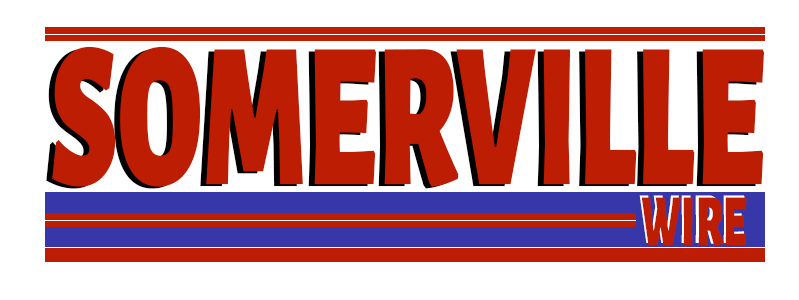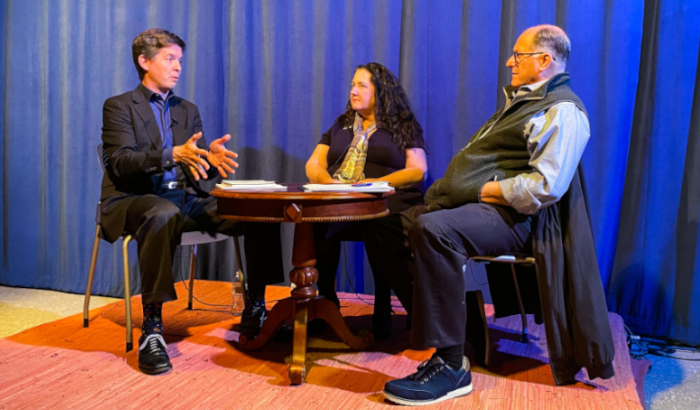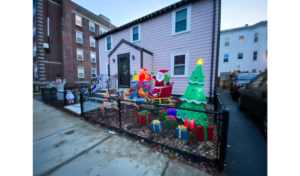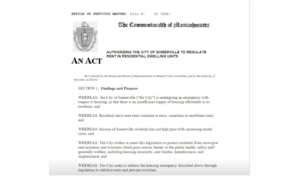Capuano-Dwan Debate at SCATV Centers on Somerville Transportation Priorities and Public Input
(Somerville Wire) – Two community leaders on different sides of the Broadway bus lane controversy sat down together last week to share their divergent views on transportation, accessibility, and accountability in Somerville.
The hour-long debate brought together safe streets activist Chris Dwan and former Mayor Michael Capuano last Wednesday, November 9 at the Somerville Media Center in Union Square.
Sponsored by Somerville Media Center, Somerville Media Fund, and Boston Institute for Nonprofit Journalism (publisher of the Somerville Wire), the event was moderated by SMC Executive Director Kat Powers. The forum was aired live on Channel 3 and recorded for YouTube.
Watch the full debate on YouTube
Dwan has served Somerville as co-chair of the city’s Urban Forestry Committee, a member of the Somerville Alliance for Safe Streets Organizing Committee, advisor to Green and Open Somerville, and a former member of the Vision Zero Task Force. Capuano has been an alderman (1976-79), mayor (1990-99), and US congressman (1999-2019).
Beginning their conversation on the specific question of the dedicated bus lanes on Broadway in Winter Hill, Capuano opened: “To me the big question is whether this bus lane has accomplished the things it said it would accomplish, and whether the city is even concerned about reviewing whether it has or not. As a resident of Winter Hill, I’m not aware that the city has looked at it since they installed it … And before they installed it, I’m not aware of any meetings they had to discuss it. So it feels as though it was simply implemented from on high, with no concern about the input or comments or concerns of the people who actually live in Winter Hill. And for me, that’s the biggest concern.”
Dwan pointed out that the City conducted a planning process, called Winter Hill in Motion, that took place before the bus lanes were installed in 2019. Meeting presentation slides, survey results, maps and plans are still available on the City’s website.
Dwan agreed that it was important to bring together diverse stakeholders to discuss changes that affect the community. Describing the process of forming the Somerville Alliance for Safe Streets, he said, “The Safe Streets Alliance was born out of a question. The question was, is there anything that the activists of this city can actually agree on outside of our activism? So we had leaders in cycling, yes, but pedestrians, transit users, seniors, folks who were trying to age in place, disabled folks, environmentalists.”
After a series of conversations, “… what we could agree on was everybody should be safe on our streets. And, when we design our infrastructure in our streets, it should be designed for equitable access so that everybody can meaningfully get around.”
Bringing together diverse voices, they found “… there’s a lot of space for agreement. And so I don’t think it’s as simple as just bike lane yes, bike lane no, parking yes, parking no. Because I think what we see in the city is we can’t all have everything and we’re all going to have to compromise.”
Powers turned to Capuano: “Do we see that kind of compromise, those public discussions about whether and where the bike lanes are?”
“No, not even close,” he replied. “And I actually want to go back to the word ‘equitable.’ That term is used a lot, by a lot of people, for a lot of things. … I would argue that part of equity should be how many people using what form of transit. If there are more people using cars than using bikes, or more people using bikes than using cars, there should be more of the road dedicated to that use. If there’s a social purpose to try to move people out of certain type of transit, say so and have that discussion. If that’s your goal, it’s a fair goal, but say it.”
Dwan countered that the City has been articulating these goals for more than a decade. SomerVision, its comprehensive, long-range planning process, was first implemented in 2012. “One of [its] primary goals was to move us from being a more car-dependent city, to making it possible to get around with less dependence on cars,” said Dwan.
“When we revisited SomerVision 10 years later, that again rose absolutely to the top. And these were projects of hundreds of people and dozens of meetings, and tabling at the farmers markets and, eventually rising to presentations at City Council, and City Council endorsing it,” Dwan said.
Responding to the “straw man” argument that the City is trying to get rid of all cars, he said, “There are people in the city who must use cars to get around. We’re never gonna hit zero cars. And we should focus … on making it meaningfully possible for the folks who have mobility challenges such that they really do need to get around by car, that they have spaces near where they live and near where they need to go. And we don’t just use that to block progress towards these other city goals.”
“I don’t disagree with anything you said,” Capuano replied, “but since 2011 there are no fewer cars going through Somerville than there were in 2011. There are no fewer resident parking stickers being given out. There are no fewer traffic problems. So therefore the goal is a wonderful goal, but it hasn’t [been] achieved.”
Capuano also asserted that the process of engaging the public in SomerVision and other planning initiatives was deficient. “When you say there were dozens of meetings and hundreds of people—I’ve been doing public meetings all my life. And the problem with public meetings, you get the same 100 people at the same 100 meetings. And this is a city of 90,000 people. The vast majority of people do not attend meetings, do not get on Zoom, do not get on Twitter, do not get on Facebook, and yet they should remain voiceless? I think not. I think it is a public official’s duty to then go out and reach out to those people who don’t show up to these meetings and ask their opinion. Drop a leaflet, knock on doors, talk to people who don’t come to these meetings and find out what they think and listen to them.”
He also said the goal of improving air quality had not been achieved either.
“I’ve had asthma since I was three years old. This city has been terribly polluted. My record on cleaning up the pollution in the city I think is unmatched,” he said. But the bus lane on Broadway “… has actually increased pollution on Winter Hill. Yes, buses travel, the city claims, approximately 30 seconds faster to transit that one-half-mile stretch of the road, and so I’ll accept the fact that buses are creating less pollution. Cars pollute too, and they pollute most when they are idling. More cars are idling on Winter Hill than ever before because of that bus lane.”
Dwan said people will not change their behavior until they have “a meaningful alternative.” For example, bus service needs to be “good enough that people begin changing their behavior—first, start taking the bus to work, to Assembly, to wherever else, and eventually shift away from dependence on the car. Eventually, maybe give up on the car entirely. It’s going to take years.”
“However,” Capuano countered, “in the meantime, there are real people going to real jobs, having real families that they want to get back to today, right now. Not 100 years from now, not 10 years from now, right now, every single day. And I think their needs today have to be part of the discussion. And most people I know don’t think they are [being heard].”
Dwan said City leaders should be able to make some decisions on behalf of their constituents. “I think there’s a space for leadership here. I think there’s a space for courageous leadership. And so we did just have a pretty vigorous election process. So far as I’m aware, every city councilor ran with street safety as a piece of their platform, and our mayor ran on street safety … There were alternatives. They didn’t make it past the primaries. So I think the people were pretty decisive in supporting that …”
“No one’s opposed to street safety,” Capuano interjected. “No one’s opposed to motherhood and apple pie either.”
Dwan continued: “And so, practically speaking, one of the things I love about living in this age, one of the few things about living in this age, I am absolutely sure that we know more today than we knew 50 years ago, about engineering, about how to build cities that work, about how to build things that work. As you said, we inherited this infrastructure. We inherited decisions from 50 and 100 and 150 years ago that we live with. It’s on us today to make courageous decisions and reach out. And we will never get to a point where everybody is happy necessarily. My goal is to get to everybody is safe and meaningfully able to get around. And right now we have people who are not safe, who are not meaningfully able to get around. The cars are absolutely in the way.”
“Well, I don’t know,” Capuano replied. “Now I’m not so sure I agree with you anymore. How do you know what to do? How did you know that this was the right way to go on Broadway? How do you know that today? And by the way, even if you feel like you know it, who anointed you? What about the rest of the people who may or may not agree with you?”
Dwan responded that Somerville needs to catch up to other cities. “Because of what we inherited, we are far, far behind a lot of cities in terms of just coming up to modern. And I think modern is a meaningfully usable transit system people can rely on to get themselves around, you know, predictable amounts of time. It should not take somebody two transfers on buses to get from where they live to where they get food, they should not have to cross three lanes in one direction, three lanes in the other, to get from where they live to food, to shopping, to school, to church, to whatever.”
Addressing Capuano, Dwan asked, “How do we get the level of engagement that you’re talking about, that would satisfy you?”
“Hard work!” Capuano replied. “You have to go to where people live. You actually have to get off the chair, off the computer, off the robocall, and go and knock on their doors, and have meetings in their neighborhoods. Hard work. It’s personal. It gets intense. But it creates a wonderful, very positive, proactive energy, to actually solve problems in a mutually respectful way.”
Capuano added, “The vast majority of people, they want to be heard, they want to have their opinions valued, and they want to have that discussion before their world is changed.”
“One of the really frustrating things about being an activist in this city is that there are so many different priorities,” Dwan said. “In the case of infrastructure that would prevent loss of life, we’re waiting for people to die so we can have the groundswell of public support that will actually get something done through the endless study, through the endless debate, through I think a very small number of people who are holding onto an untenable memory that we inherited. I feel very personally frustrated that we have to wait for people to die in the street before we do the basic stuff that we know we should have done to save lives.”
Photo credit: Broadway Bus Lanes Debate Between Michael Capuano and Chris Dwan at Somerville Media Center, November 9, 2022. Photo by Jason Pramas. Copyright 2022 Jason Pramas.
Linda Pinkow is a reporter for the Somerville Wire. She is also a development consultant for the Boston Institute for Nonprofit Journalism.





